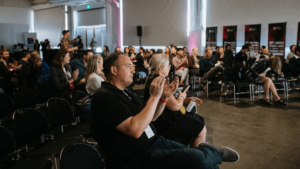An unconference is typically one which has no pre-set agenda and creates a space for peer-to-peer learning.
Instead of a conventional programme of keynote speaker sessions, the attendees decide what they want to talk about on the day. Anyone who wants to initiate a discussion can claim a space and time to do so.
The unconference format was developed by the technology sector and has since been successfully used by industries of all sorts. Interested in shaking up your next conference? We reached out to six unconference organisers to ask them about the benefits and challenges of using this untraditional method…
- Guido Jansen, Founder, Dutchento
“Dutchento is the Dutch Magento community, organising conferences, workshops and meetups around Magento since 2008. We attended an unconference in Germany and it was such great fun we wanted to organise one ourselves too.
“We did our first last October and will organise another one, The Magento UnConference, next August because the first was such a great success.
“The programme will be made on the spot by participants writing their talk or discussion idea on a piece of paper after which we’ll all vote on the best talks. This facilitates more interaction and a programme that is based on the relevancy to the audience.
“I think a benefit for the organiser is that there is less organising involved regarding the programme and speakers, but for an audience that is unfamiliar with the concept, you do need to focus on your communication and marketing.
“You can mitigate the risk involved by inviting some key community members that already have experience with unconferences, as well as experienced speakers that can always jump in by proposing topics.
“It’s important to encourage everyone to get involved so one of the first sessions we propose is “A talk about giving talks,” to inspire others to step up and do a talk.
“An inspiring location also really helps – we had an old Dutch fort with good meeting rooms – and make sure you have enough time for social activities like a barbecue, games and networking to get things going.”
- Rachel Carrell, CEO, Koru Kids
“As CEO of Koru Kids, a tech startup which helps parents to nanny share, I’ve been to and organised many conferences, and I much prefer unconferences.
“At a normal conference, the agenda is very rigid. Just as a discussion is getting going, it has to get shut down because the agenda says it’s time to move on. That stifles the energy of the group and leaves people feeling unsatisfied and overly controlled.
“Unconferences feel very different. The energy builds and stays high. The agenda naturally incorporates sessions and learning from earlier in the unconference, so that it feels like sessions are building on each other over the course of the whole event. This is immensely satisfying for the participants.
“We’ve found that unconferences initially feel more scary and risky as an organiser. It’s still quite an unknown format. Ultimately unconferences are much more fulfilling for participants and therefore completely worth it.
“It’s no harder to organise an unconference than a traditional conference. In some ways it’s easier, as you don’t need to guess what participants want out of it – whatever they want, it’ll naturally emerge!
“Some of the same challenges as always apply – for example, you do need to be mindful of diversity of participation. In the same way that you might try to ensure there are lots of women and minorities on panels, you should ensure that these people are encouraged to be ’emergent leaders’.
“Sometimes this can be done by shoulder-tapping and informal encouragement, other times you might need an explicit reminder in an opening address or code of conduct.”
- Sukhvinder Pabial, Co-Founder, L&D Connect
“L&D Connect is a community of learning and development professionals and we have facilitated about 10 unconferences over the last 5 years, in different venues across the UK. They’re always popular; our next, L&D Connect Unconference – London, will take place in May and is already nearly sold out.
“We’ve learned loads in doing them and built a really strong community of professionals as a result. For everyone involved they prove to be a strong way to test what you know, how you do what you do, and a safe space to experiment with new and different techniques.
“One of the key benefits of an unconference is the mature nature of how it’s organised. Everyone is responsible for their part in the day so no-one is held any more accountable than anyone else.
“Also, it’s the conversations. People get to have grown-up conversations during the event and that’s a very affirming activity to be able to do. And another is that there’s no sponsors, vendors, selling or pitches. It’s driven by content decided by the participants.
“For a traditional conference you have to make the event profitable otherwise you lose money. With an unconference you can make it highly accessible to people because all you need to cover are costs for the day – unless you’re running them as a business, which we don’t through L&D Connect.
“Unconferences aren’t disorganised or unorganised! That’s a myth. They are simply a different format for learning and discussion to take place. The structure is in the design of the day. Different facilitation techniques enable people to participate in different ways. What can seem like a lack of organisation is the open nature of the discussions that take place and the topics up for discussion.
“If you use a facilitation technique to enable the event like Open Space, there are principles to help people understand how to contribute. If they feel like someone is dominating a conversation, they are under no obligation to stay present. That’s highly empowering and not often advocated in other settings. That design means it doesn’t matter if you’re introvert of extrovert – you decide how you take part.”
- James Pollard, Founder, TheAdvisorCoach.com
“I’m a marketing consultant who works specifically with financial advisors. Because I work so closely with financial advisors, unconferences are a large part of what I do. You could call them ‘mastermind groups’.
“The reason I like these so much more than traditional conferences is because they are more informal and the financial advisors get to decide what they want to talk about, which also helps me develop future product ideas.
“The biggest benefit for participants is that they decide the content. If a conference organiser or speaker decides content, it may or may not apply to the people in attendance. An unconference is a way to guarantee that the information is relevant.
“I’ve found that it’s much easier to organise one of these conferences, as long as you can decide on a good date and time. I ensure that it has enough structure by having at least some form of an agenda planned in advance.
“That also helps me make sure people participate – I send out a few surveys in advance to see what questions people have and what they’d like to learn more about.
“The biggest lesson I’ve learned in organising dozens of these is that you need to get information beforehand. Don’t try to wing it. Get at least some idea of what the people want to gain from the experience. Yes, they are informal, but sending out a survey in advance and collecting some preliminary information is priceless.”
- Jenifer Daniels, Founder, Colourstock
“In 2014 I used my experience as a PR strategist & techpreneur to launch #GoodCamp, a user-generated unconference fusing public relations, marketing, social media, and technology for nonprofits.
“I decided to launch #GoodCamp after attending several BarCamp events. I believed that this model was transferrable to my industry and that it would be a more cost-effective education model for my audience.
“The key benefits for me, the organiser, are subject matter expertise and peer recognition. The key benefits for the participants are thought-provoking discussion, debate and interactive participation on emerging trends, the latest issues and new projects.
“It is harder to organise an unconference because participants have mixed expectations of the event and its outcomes. I ensured that the event had structure by completing outreach for potential speakers/pitchers prior to the event. I spent significant time talking with potential participants about their desired outcomes and reached out to local professionals that I believed could effectively present.
“We asked everyone in attendance to pitch possible topics in writing. That way, those who decided to pitch had a better understanding of the participant’s knowledge gaps. Everyone voted on pitches using a blind voting system. Everyone could vote for multiple pitches.
“Lessons learned from organising the event are: start planning your event six months ahead of time by reaching out to professional associations that include your target market.
“For example, I targeted local chapters of the American Marketing Association and Public Relations Society of America too late in the process. Both organisations had solidified their calendars, and many of their members didn’t see the value in an unconference if a formal conference was booked around the same time period.”
- Nick Staite, Operations Director, Planet Earth Institute
“Since 2013, the Planet Earth Institute (PEI) has run the #ScienceAfrica UnConference, our annual flagship event that brings together over 250 people from business, academia, policy, and civil society to discuss, debate and connect about the big challenges facing Africa.
“We believe that unconferences are highly beneficial, as this type of event allows organisers to connect with a huge range of stakeholders from private sector representatives to academics to diplomats. The output from our unconferences has also been a huge source of inspiration for the PEI’s efforts to advocate for high-quality and industry-relevant science in Africa.
“Our participants appreciate the sheer diversity of people that they are able to connect with. What’s more, our #ScienceAfrica UnConferences provide a valuable opportunity for our commercial partners to showcase their work, and educate attendees about their engagement in Africa.
“We find unconferences require as much hard work on logistics and organisations as traditional conferences! Several months in advance, the PEI sends out invitations to distinguished figures to act as speakers, selecting and inviting individuals and organisations to act as workshop leaders, and much more.
“There is definitely a risk that unconferences could be disorganised due to the loose and open event format. We give our events structure by setting a programme, which schedules our high-level panel discussions, workshops and table working groups. This ensures that all attendees know exactly what it is happening, but it is open enough to permit active discussions and debates.
“We encourage people to participate by providing a range of activities, which ensure that everyone gets their say, regardless of personality type! First of all, we begin with small table working groups, encouraging guests to discuss key issues with their neighbours. This work forms the basis for feedback during the panel sessions, and our Key Outcomes Report, which we create following the unconferences.
“In the morning and the afternoon, we run 10 structured interactive workshops and participants can choose the workshop that they want to attend. In addition, our #ScienceAfrica UnConferences provide a number of open spaces that allow conversations to flow and connections to be made. Last but definitely not least, we host a drinks reception at the very end of the day, which is a great opportunity for guests to unwind and meet new people.”
Conclusion
Hosting an unconference is one way to guarantee your event’s content is truly relevant to attendees. However, if doing away with traditional keynotes, organisers must ensure participants include those able to provide the necessary expertise.
Although they’re loosely structured, organising a truly effective unconference still involves a fair amount of planning and active facilitation – but if these case studies are anything to go by, it’s well worth the effort.





